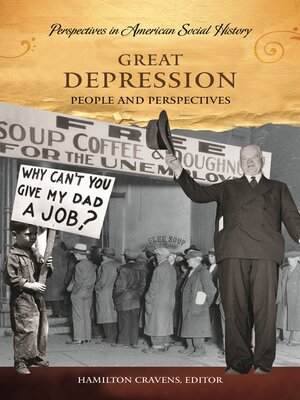Great Depression
ebook ∣ People and Perspectives · Perspectives in American Social History
By Hamilton Cravens

Sign up to save your library
With an OverDrive account, you can save your favorite libraries for at-a-glance information about availability. Find out more about OverDrive accounts.
Find this title in Libby, the library reading app by OverDrive.



Search for a digital library with this title
Title found at these libraries:
| Library Name | Distance |
|---|---|
| Loading... |
An insightful collection of essays focused on American men, women, and children from a range of economic classes and ethnic backgrounds during the Great Depression.
Who were the people waiting in the bread lines and living in Hoovervilles? Who were the migrants heading North and West? Did anyone survive the Depression relatively unscathed? Giving a voice to stories often untold, Great Depression: People and Perspectives covers the full spectrum of American life, portraying the experiences of ordinary citizens during the worst economic crisis in the nation's history.
Great Depression shows how specific groups coped with the traumatic upheaval of the times, including rural Americans, women, children, African Americans, and immigrants. In addition, it offers revealing chapters on the conflict between social scientists and policymakers responding to the crisis, the impact of the Depression on the health of U.S. citizens, and the roles that American technology and Hollywood movies played in helping the nation survive.
Who were the people waiting in the bread lines and living in Hoovervilles? Who were the migrants heading North and West? Did anyone survive the Depression relatively unscathed? Giving a voice to stories often untold, Great Depression: People and Perspectives covers the full spectrum of American life, portraying the experiences of ordinary citizens during the worst economic crisis in the nation's history.
Great Depression shows how specific groups coped with the traumatic upheaval of the times, including rural Americans, women, children, African Americans, and immigrants. In addition, it offers revealing chapters on the conflict between social scientists and policymakers responding to the crisis, the impact of the Depression on the health of U.S. citizens, and the roles that American technology and Hollywood movies played in helping the nation survive.







